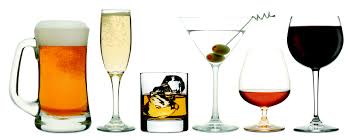Bariatric Realities – Medical Professionals’ Guidelines about Alcohol Use & WLS

Bariatric Realities – Medical Professionals’ Guidelines about Alcohol Use & WLS
I know I said my next article was going to be on causes of obesity, but I got carried away tonight doing some investigating about the professional medical guidelines for alcohol use after weight loss surgery. In summary, the gist of the recommendations are: “Patients undergoing bariatric surgery should be screened and educated regarding alcohol intake both before and after surgery… patients should be made aware that alcohol use disorders (AUD) can occur in the long term after bariatric surgery.” (From: http://asmbs.org/resources/alcohol-use-before-and-after-bariatric-surgery.)
Well, now. Those are some non-specific medical recommendations by medical professionals who are the predominant leaders and caregivers of the surgical weight loss population. Education and awareness. Hey – I am all about education and awareness. Great things, education and awareness.
And yet, I’m gonna say that as a recommendation, that is a very “PC” non-recommendation recommendation, when one considers that we are talking about 1) ALCOHOL and 2) WEIGHT LOSS SURGERY patients.
Consider these educational nuggets and facts I found that WLS patients really ought to be aware of:
Psychologist Stanton Peele, writes, “readers now know that scientifically, it's not alcohol that causes people to live longer, but it is simply being with others and that they are less socially isolated when they drink that prolongs their lives. After all, alcohol is a toxin.” (italics and bold added) (From https://www.psychologytoday.com/blog/addiction-in-society/201011/science-is-what-society-says-it-is-alcohols-poison.
My comments: Yes – alcohol is a toxin, and that means POISON. Those of us in the medical field really ought to know that people are not supposed to ingest poison. But the recommendations do not say, “Do NOT ingest the toxin, alcohol.” No, no, no… they say be educated and aware.
Dr. Charles S. Lieber, M.D., M.A.C.P., in a publication for the National Institute on Alcohol Abuse and Alcoholism, writes, ““A complex interplay exists between a person’s alcohol consumption and nutritional status,” and … alcohol and its metabolism prevent the body from properly absorbing, digesting, and using essential nutrients” (italics added.) Dr. Lieber does indeed, educate us about the nutritional value of alcohol: “Alcohol would not fall under the category of an essential nutrient because not having it in your diet does not lead to any sort of deficiency. Alcoholic beverages primarily consist of water, pure alcohol (chemically known as ethanol), and variable amounts of sugars (i.e., carbohydrates); their content of other nutrients (e.g., proteins, vitamins, or minerals) is usually negligible. Because they provide almost no nutrients, alcoholic beverages are considered ‘empty calories.’ Therefore, any calories provided by alcoholic beverages are derived from the carbohydrates and alcohol they contain.” (italics added)
My comments: People who have weight loss surgery (other than the band) experience absorption issues to one degree or another. Nutritional deficiency is one of the concerns the medical professionals monitor in the months and years following WLS. We stress to patients the importance of taking vitamin supplements for the rest of their lives to help ensure proper nutritional balance.
And yet, rather than saying, “Alcohol use is unwise after WLS,” or “Don’t drink alcohol after WLS,” the governing body of health professionals for bariatric surgery recommends being “educated” and “aware.”
Is that happening? Are the physicians and surgeons and nutritionists and mental health professionals educating patients and making patients aware that ALCOHOL IS A TOXIN THAT CAN INTERFERE WITH VITAMIN ABSORPTION – and it should not be consumed after weight loss surgery? I can’t answer that, although I know we do this at the programs I work with. If it’s not happening, why not?
Having a background in direct sales, which, ironically, was incredible education for my later career as a psychologist, I was taught to “anticipate the objections.” Many health care professionals may be pooh-pooh’ing the vitamin deficiency issue associated with alcohol, stating it’s only those who drink heavily who are at risk for this type of vitamin deficiency. That information, to the best of my knowledge, is relevant for persons who have not had weight loss surgery. What’s more, we don’t know the extent to which people are drinking many years after WLS. Most of the research, as noted in the ASMBS Guidelines/Statements entitled ASMBS position statement on alcohol use before and after bariatric surgery, states, “The existing studies do not present a uniform picture regarding the overall prevalence of lifetime or current alcohol use disorders (AUD) in patients seeking bariatric surgery. The vast majority of the existing literature is retrospective, with small sample sizes, lack of control groups, and low response rates. There are also varying definitions of alcohol disorders (“high-risk” versus “misuse” versus “abuse/dependence”) in the bariatric surgery literature.” In other words, this research does provide some information, but remember, we don’t really know that much because there isn’t enough research on enough people over a long enough period of time. We don’t then, know the actual affect that alcohol use has on vitamin absorption for WLS patients. We DO know that vitamin deficiency is a concern, so WHY aren’t we telling people not to drink?
Not only is alcohol a toxin for our bodies, “Alcohol is actually classified as a drug and is a known depressant. Under this category, it is the most widely used drug in the world. According to the National Institute of Alcohol Abuse and Alcoholism (NIAAA)” (italics and underling added). http://www.medicinenet.com/alcohol_and_nutrition/article.htm
My comments: I am literally chuckling now at the absurdity of this situation. The situation being the medical professionals, all having a code of ethics that reflects the “do no harm” sentiment, ignoring potential harm for their patients. Please note that we would all consider alcohol as being “empty calories” and having sugar/carbohydrates and certainly no protein.
PLEASE let it be the case that the mental health practitioners around the world who deal with surgical weight loss patients are telling them, “Don’t eat empty calories. Eat a lot of protein. Limit the simple carbs and sugar. And refrain from consuming your calories from liquids. NO STARBUCKS. BUT, HEY - GO AHEAD AND DRINK THOSE SUGAR/CARB LADEN, EMPTY, NUTRITION-ROBBING TOXIC CALORIES IN ALCOHOL, THAT ARE, BY THE WAY, THE MOST WIDELY ABUSED DRUG IN THE WORLD.”
Honestly, that sentence should be the entire article.
But WAIT! There’s MORE!
I really love this last tidbit I’ll share with you. It’s so much nicer for me when I can find it online so it’s not that mean, alcohol-hating Dr. Stapleton being the one to blame!
“The truth is that no one needs alcohol to live, so regardless of what you've heard or want to believe, alcohol is not essential in our diets. Did you know that a glass of wine can have the same calories as four cookies? How about a pint of lager – surprised to hear it’s often the caloric equivalent of a slice of pizza? You do not need to be an alcoholic for alcohol to interfere with your health and life.”
Do you hear this, people in the medical profession? Are you giving the OK for your patients to eat four cookies “now and then,” or “in moderation,” or “not for the first six months, or year after surgery?” Do you realize that you may be DOING HARM by giving your patients “permission” to drink alcohol?
“But our job is not to be the watchdog or decision-maker for people.” Another potential objection to my dismay about the recommendations being for “education” and “awareness,” rather than a direct, “SAY NO TO ALCOHOL” stance. I agree that no one can make the decisions about what people can or cannot do, or what they will or will not do. People in the medical field do tell people things like, “Don’t get that wet or you could get an infection,” “Keep the splint on for the next six weeks if you want to heal properly.” There ARE dos and don’ts that are educational and increase awareness. What’s the real issue that medical professionals don’t take a hard stance on alcohol after WLS? I don’t know. I do know that I did my dissertation on medical doctor’s attitudes toward addiction. Turns out it is much like that of their attitudes toward obesity: many don’t know that much about it, very many do not feel comfortable working with it, and most don’t care about/understand it.
To top it all off, HERE’s the real kicker… Not only do the medical AND some of the WLS organizations not tell people, “Don’t drink alcohol,” THEY PROVIDE ALCOHOL AT THEIR EVENTS!
I can’t say any more.
Connie Stapleton, PhD
Facebook: Connie Stapleton
Twitter: @cstapletonphd
LinkedIn: Connie Stapleton, Ph.D.
Speaking only for myself, I'd prefer an occasional glass of wine to an occasional four Cookies, hands down.
I'm an adult. I'm educated and capable of educating myself about the pros and cons of alcohol intake now that I'm sleeved.
I neither want or need anything beyond education on the matter from my bariatric team. Like every bite I put in my mouth and every step I take toward improved fitness, these are my responsibilities for my life, and my lifetime. I neither want nor need draconian edicts in an attempt to scare me into adherence into what anyone thinks I "must" do, or not. It's paternalistic, patronizing, and unwelcome.
Great thoughts, opinions and ideas! Thank you for sharing your experiences and beliefs. Helps us all learn and grow!
I am not denying that alcohol can be a problem - it hits you much harder post WLS. At 4 years out though, I consider social drinking as one of my lifestyle balancing acts. I don't need the empty calories, very true, but I am maintaining at goal, have healthy blood work, healthy liver (had scan done due to stones so could see my liver looked good per the doctors) and as mentioned above, much prefer my few times a month happy hour with the girls or wine on a dinner date over dessert etc.
It is a balancing act and we all need to take responsibility for how we choose to "balance" and seek help when it becomes a problem... or if health, lifestyle, family, friends etc are impacted. Honestly, I am more likely to binge on ice cream so THAT is something I need to have pretty much abstince on.
So you're anti-alcohol of any kinds for WLS patients and think all WLS patients should be or become tee-totalers ... right?
Do you feel the same way about alcohol for patients a year out (and in maintenance) as during the weight-losing phases?
Do you also recommend no-Cookies for WLS patients? Ever? Even in maintenance?
What about cake?
Barbeque (and all the sugar in those BBQ sauces)? Chili?
Breads? If not all breads, which kinds / brands?
What about coffee? Tea? Marijuana?
What about sweet potatoes? White potatoes?
Fruits -- with or without sugar?
Thank you for your response! I'm not a nutritionist, or a physician, but I'll answer each of your questions from my perspective and having worked in a bariatric center for the last 12 years. But please consult your physician and nutritionist.
So you're anti-alcohol of any kinds for WLS patients and think all WLS patients should be or become tee-totalers ... right? Personally, I am against alcohol for all WLS patients for the reasons mentioned in the article, including: alcohol is a toxin, it is empty calories, it is empty liquid calories, and there are potential nutritional absorption issues that could be made worse by drinking alcohol.
Do you feel the same way about alcohol for patients a year out (and in maintenance) as during the weight-losing phases?
Yes, for the same reasons as stated above.
Do you also recommend no-Cookies for WLS patients? Ever? Even in maintenance?
Recommend? Yes, I would recommend no Cookies, although I wouldn't expect in reality that a person may never have a cookie again. Four cookies at a time? I would never recommend that. Unlike alcohol, however, a cookie is not a toxin that interferes with absorption of essential nutrients.
What about cake?
Recommend? Yes, I would recommend no cake, although I wouldn't expect in reality that a person may never have cake again. Unlike alcohol, however, cake is not a toxin that interferes with absorption of essential nutrients.
Barbeque (and all the sugar in those BBQ sauces)? Chili?
There are no toxins that interfere with absorption of essential nutrients in these foods. There are carbs in all foods other than lean meat, so people will eat some carbs. I do not recommend going carb-free.
Breads? If not all breads, which kinds / brands?
There are no toxins that interfere with absorption of essential nutrients in these foods. There are carbs in all foods other than lean meat, so people will eat some carbs. I do not recommend going carb-free. Always the healthier the better.
What about coffee? Tea? Marijuana?
I would ask your doctor and nutritionist about coffee and tea. I believe there are other reasons they suggest to limit these. Marijuana? No, I would not ever RECOMMEND that someone use marijuana (unless POSSIBLY in the case of medical illness).
What about sweet potatoes? White potatoes?
There are no toxins that interfere with absorption of essential nutrients in these foods. There are carbs in all foods other than lean meat, so people will eat some carbs. I do not recommend going carb-free.
Fruits -- with or without sugar?
There are no toxins that interfere with absorption of essential nutrients in these foods. There are carbs in all foods other than lean meat, so people will eat some carbs. I do not recommend going carb-free.
So - those are my thoughts. Again - please consult your physician and nutritionist as those are not my areas of expertise.
Be well!
I respect your position. Many people make the choice to consume alcohol in a social manner. I have no issues with people drinking alcohol. I believe each individual needs to consider their circumstances (medical and others) and make their own choice. I believe that the medical community, however, needs to make it clear that alcohol is a toxin, can interfere with the absorption of essential nutrients, and that it is definitely nothing but empty calories.
I think you bring up some very good points.
One thing I have observed just on BariatricPal is that for those of us who are not really drinkers to begin with, the idea of possibly never drinking again is not a big deal.
But, for those who are drinkers (from regular social drinkers all the way to full-blown practicing alcoholics), just the idea of never drinking again will often lead to very strong negative reactions,
I would guess that the "medical community" recognizes that if these people are going to be helped and will even listen to health advice, they will be more effective with a less restrictive message.
Alcohol use is a HUGE hit button issue on this forum. I encourage you to read some of the alcohol-related threads.
Actually, for me it isn't about the alcohol at all. It's more the all-or-nothing, "WLS patients can't be trusted to make good decisions" attitude that fries me.Alcohol use is a HUGE hit button issue on this forum. I encourage you to read some of the alcohol-related threads.
I'm a grownup. This is my life, my sleeve, and my health. I accept full responsibility for them.
know thyself.
I got a bottle of Baileys for christmas. My christmas eve dinner party ended with us each having a small bit on ice. It has been in my cabinet since... haven't even thought about it until now.
A week ago, I bought a container of choc chip mint ice cream. I ate a 1/2 cup a day until it was gone - I measured.. I couldn't forget it, the siren's call was so strong it was all I could do to keep from eating until I felt sick which is why I put it in these tiny 1/2 cup serving dish and forced myself to not heap it. I should have thrown it away.
So, for me, clearly ice cream is something I probably can't manage all that well as it is an old trigger (I don't even like it THAT much but it just seems to call my name!) whereas a bottle of spirits has it's time and place and I don't have white knuckle it to ignore it whilst under my roof.
They are both empty calories, there are clearly healthier foods and drinks to consume, but one calls my name and the other doesn't.
I guess I have a problem with the one size fits all approach and I while I do agree that addictions can be a real problem, and should be considered - it seems like it is an overgeneralization to say that people in maintenance should "never" do ...fill in the blank...
We need to know ourselves and how to balance a healthier lifestyle against things we enjoy or find fun.
I know several cigarette smokers - talk about something useless and harmful to consume!! Why aren't we ranting about THAT?!?
I keep thinking about a quote from a minister when the temperance movement began in the US in the 19th Century: "very little good comes from the absolute shall."
I've always taken the approach of explaining the pluses and minuses of recreational drugs. Why the positives? Because people are getting something out of it if they are using it, and to ignore that would be less than honest with my kids. It's in the honest cost/benefit analysis that helps guide them so they can make the positive decisions that I do hope they will make.
Alcohol has been an on again, off again struggle with me (before and after WLS). Some WLS patients have a sip of wine and feel intoxicated, and I have a tough time feeling it at all unless I drink a great deal. So to change and relearn my relationship with alcohol, I used some techniques from this site: https://hamsnetwork.wordpress.com/.
I also found me keeping my eye focused on bigger goals makes it much easier to say "not now" than scare tactics. But everyone is different. Some need hard fast rules, others need general guidelines. Personally I agree with Dee Hock:
"Simple, clear purpose and principles give rise to complex intelligent behavior. Rules and regulations give rise to simple stupid behavior."
Understanding addiction, substance use and abuse is incredibly complex. It has never been aided by alarmist media treatment. There are no simple solutions. I am always amazed at the dismal success rate of "rehab." I am also amazed that the vast majority of drug/alcohol users go through life with scant few problems.
I have felt that my kids stayed out of trouble because there was always clear communication, acceptance, tolerance, encouragement and lack of judgement in the family. "Absolute Shall's" just don't work for me.
But if you are going to talk about alcohol, you have to include the best political speech of all time and the best on the subject:
Read it here:
http://www.rdrop.com/users/jimka/whisky.html
John Grisham reads it for you here:
Thank you! I will definitely read some of the threads. Going on vacation next week so that will be a good time to do so!
Connie
Thank for the reading by John Grisham! Indeed, a very good narrative! As I have said, I don't have a problem with people drinking alcohol - if it's not contraindicated for them for whatever reason. I stand firm in my belief that for those who have WLS, alcohol has no place in their "diet." Very much enjoyed the video!
Connie










SweetPeas 117
Posted
The endocrinologist, psychologist, nutritionist, and surgeon all told me not to drink alcohol. They said that this would be a "forever" lifestyle change (and their program requires you not drink during the pre op phase or they won't approve you for surgery). They very explicit that "moderation" isn't an option and noted that there is evidence that WLS patients have higher rates of alcoholism post op. They all had a lot of research and statistics and related the issues with Vitamin absorption, dumping, weight regain, and told me about a couple of patients that had not heeded the warning and spiraled out of control with alcohol (DUIs, losing their jobs, etc.). I would consider myself to have been a social drinker- a glass of wine at dinner maybe twice a month but after what the WLS team told me I wouldn't even consider touching it now.
Share this comment
Link to comment
Share on other sites